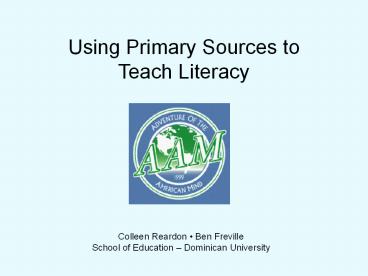Using Primary Sources to Teach Literacy - PowerPoint PPT Presentation
1 / 16
Title:
Using Primary Sources to Teach Literacy
Description:
photographs, videos, prints, art work. newspapers, advertisements. travel logs. diaries & journals ... http://www.loc.gov. http://lcweb2.loc.gov/ammem/ndlpedu ... – PowerPoint PPT presentation
Number of Views:28
Avg rating:3.0/5.0
Title: Using Primary Sources to Teach Literacy
1
Using Primary Sources to Teach Literacy
Colleen Reardon Ben FrevilleSchool of
Education Dominican University
2
Mindwalk
3
PrimarySourceDocuments
Actual records from a given period in time.
4
(No Transcript)
5
http//www.loc.gov
6
Treasure Hunt
http//lcweb2.loc.gov/ammem/ndlpedu/educators/work
shop/discover/treas.html
7
Science and Innovation
Bell - Activity Find a drawing of the first
telephone. What date is on the drawing?
http//memory.loc.gov/ammem/bellhtml/belltelph.htm
l
Wright - Activity What newspaper exaggerated the
facts about the first airplane flight?
http//lcweb2.loc.gov/cgi-bin/query/r?ammem/mcc_at_f
ield(DOCID_at_lit(mcc/061))
8
Who said what?
Conservation movement - Activity What German
biologist coined the word ecology in 1866? Look
for a timeline.
http//memory.loc.gov/ammem/amrvhtml/cnchron1.html
African American Perspectives - Activity Who
said "The lesson of all ages is that a wrong
done to one man is a wrong done to all men?" To
find the author of this quotation, click on
search, then choose full text. Try typing
different combinations of words like lesson of
all ages. What happened?
http//memory.loc.gov/ammem/aap/aaphome.html
9
Documents
Century of Lawmaking - Activity What was the
Congressional Globe? What is its importance in
history?
http//memory.loc.gov/ammem/amlaw/lawhome.html
Theodore Roosevelt - Activity What was contained
in the letter that Theodore Roosevelt wrote to
his young son? HINT search by keyword
Theodore Roosevelt letters
http//memory.loc.gov/ammem/mcchtml/corhome.html
10
Why use primary sources?
- They recapture the spirit of the times. L.
Gottschalk (1950). - They provide a window into the thinking of a
particular time period. - They can expose students to multiple perspectives
on issues of the past and present.
11
- The can foster skills in
- synthesizing diverse materials,
- thinking critically,
- making inferences,
- developing reasoned explanations, and
interpretations, - strengthening vocabulary,
- locating material from a variety of sources.
12
- They help students recognize and appreciate what
is special or unique about a particular time
period. - They can foster in students the skills of a
historian.
Interview with Wallace Quarterman, Fort
Frederica, St. Simons Island, Georgia (Gullah),
June 1935
13
Limitations of Primary Source Documents
- Provides one perspective.
- Tells a partial story.
- Time may not be allow for the examination and
analysis of sufficient number of sources.
- May be lengthy and contain vocabulary that is
foreign to students. - Reading level of a document may be difficult for
students at a given grade level.
14
When selecting primary sources, consider
- Interests of students
- Reading level
- Length of source--excerpts? selections?)
- Points of view--balanced?
- Variety of sourcespublished, unpublished, text,
visual, audio, etc. - Quality of sources
15
Today in History
or
Jump Back in Time
16
wintersnowy coldsledding, sliding, shiningcold
windy blowing snowblustery
First Snow of the Season, Foothills of Little
Belt Mountain, MontanaRussell Lee, photographer,
August 1942































